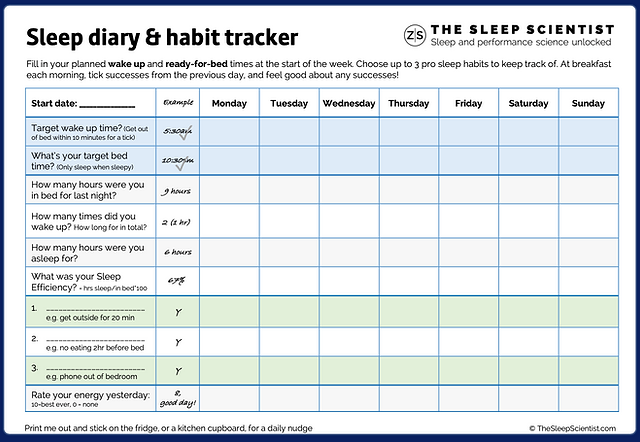If you’ve ever struggled with insomnia, you know how frustrating it can be. Tossing and turning, staring at the ceiling, and feeling exhausted the next day can take a toll on your overall well-being. But what if I told you there’s a simple tool that could help you track your sleep patterns and potentially uncover the root causes of your insomnia? Enter the sleep diary, a valuable resource that can provide insights into your sleep habits and help you make positive changes. In this article, we’ll explore the importance of keeping a sleep diary to track insomnia patterns and how it can be a game-changer in your quest for a good night’s sleep.
Picture this: you’re lying in bed, struggling to fall asleep night after night. You’re tired of feeling tired, and you’re desperate for a solution. That’s where a sleep diary comes in. This handy tool allows you to track important information about your sleep, such as the time you go to bed, how long it takes you to fall asleep, how many times you wake up during the night, and how rested you feel in the morning. By keeping a sleep diary, you can start to identify patterns and potential triggers for your insomnia. Are you more likely to have trouble sleeping on nights when you’ve had caffeine late in the day? Does stress or anxiety play a role in your sleepless nights? With a sleep diary, you can begin to connect the dots and gain valuable insights into your sleep patterns. So, is it important to keep a sleep diary to track insomnia patterns? Absolutely! Let’s dive deeper into how to get started and the benefits it can bring.
Is It Important to Keep a Sleep Diary to Track Insomnia Patterns?
A sleep diary is a tool that can be used to track and monitor sleep patterns and habits. It involves recording information about your sleep, such as the time you go to bed, the time you wake up, and any disturbances or difficulties you experience during the night. Keeping a sleep diary can provide valuable insights into your sleep patterns and help identify potential causes of insomnia. In this article, we will explore the importance of keeping a sleep diary and how it can be beneficial in tracking insomnia patterns.
The Benefits of Keeping a Sleep Diary
Keeping a sleep diary can be incredibly beneficial for individuals who struggle with insomnia. Here are some key benefits of maintaining a sleep diary:
- Identifying patterns: By recording your sleep habits and patterns, you can start to identify any recurring issues or patterns that may be contributing to your insomnia. For example, you may notice that you have trouble falling asleep on certain nights or that you consistently wake up at the same time. These patterns can help you pinpoint potential triggers and make necessary adjustments.
- Identifying triggers: A sleep diary can help you identify potential triggers that may be causing or exacerbating your insomnia. By tracking factors such as your daily activities, diet, and stress levels, you can identify any correlations between these variables and your sleep quality. This information can be incredibly valuable in developing strategies to manage and improve your sleep.
Overall, keeping a sleep diary allows you to gain a deeper understanding of your sleep patterns and habits. It can help you identify potential triggers and make informed decisions about your sleep routine. Now let’s explore some tips on how to effectively keep a sleep diary.
Tips for Keeping a Sleep Diary
Keeping a sleep diary requires consistent and accurate record-keeping. Here are some tips to help you maintain an effective sleep diary:
- Be consistent: Try to record your sleep data every night, ideally at the same time each day. Consistency is key in tracking and analyzing your sleep patterns.
- Include relevant information: In addition to recording the time you went to bed and woke up, include any factors that may have influenced your sleep. This can include caffeine or alcohol consumption, exercise, stress levels, and any medications or supplements you may have taken.
By including these details, you can paint a more comprehensive picture of your sleep habits and identify potential factors that may be impacting your sleep quality.
The Role of a Sleep Diary in Tracking Insomnia Patterns
A sleep diary plays a crucial role in tracking insomnia patterns. It allows you to document the frequency and severity of your insomnia symptoms, as well as any potential triggers or patterns that may be contributing to your sleep difficulties. By consistently recording this information, you can provide valuable data to healthcare professionals, allowing them to make a more accurate diagnosis and develop a targeted treatment plan.
Additionally, a sleep diary can help you monitor the effectiveness of any interventions or strategies you implement to improve your sleep. By tracking your progress over time, you can assess whether certain lifestyle changes or therapies are having a positive impact on your insomnia symptoms.
In conclusion, keeping a sleep diary can be a valuable tool in tracking insomnia patterns. It allows you to identify patterns, triggers, and potential solutions to improve your sleep quality. By consistently recording your sleep habits and experiences, you can gain a deeper understanding of your insomnia and work towards finding effective solutions. Start keeping a sleep diary today and take the first step towards better sleep.
Key Takeaways: Is it important to keep a sleep diary to track insomnia patterns?
- A sleep diary can be a helpful tool to track patterns and identify potential causes of insomnia.
- By recording information such as bedtime, wake-up time, and sleep quality, you can better understand your sleep patterns.
- Keeping a sleep diary can help you identify triggers or patterns that may be affecting your sleep, such as caffeine consumption or stressful events.
- Regularly tracking your sleep can provide valuable information to healthcare professionals when seeking treatment for insomnia.
- Consistency and accuracy are key when maintaining a sleep diary to ensure accurate data for analysis.
Frequently Asked Questions
Why should I keep a sleep diary to track insomnia patterns?
Keeping a sleep diary can be incredibly helpful in understanding and tracking your insomnia patterns. By recording details about your sleep habits, you can identify potential triggers and factors that may be contributing to your sleep difficulties. A sleep diary allows you to monitor your sleep duration, quality, and any disruptions or disturbances throughout the night.
Additionally, a sleep diary provides valuable information to healthcare professionals, enabling them to make a more accurate diagnosis and develop a tailored treatment plan. It serves as a resource for identifying patterns and trends over time, helping both you and your healthcare provider gain insight into your specific sleep challenges.
What information should I include in a sleep diary?
When keeping a sleep diary to track insomnia patterns, it’s important to record specific details about your sleep routine and environment. Include the time you go to bed and wake up, as well as any naps taken during the day. Note any medications or supplements you take that may impact your sleep, along with any substances like caffeine or alcohol that you consume.
It’s also helpful to document your activities leading up to bedtime, such as exercising, using electronic devices, or engaging in relaxation techniques. Additionally, record any factors that may affect your sleep, such as stress levels, emotional state, or physical discomfort. By capturing these details consistently, you can identify patterns and make informed decisions about your sleep habits.
How frequently should I update my sleep diary?
To effectively track insomnia patterns, it’s recommended to update your sleep diary daily. Consistency is key in capturing accurate and meaningful data. By recording your sleep habits and experiences each day, you can identify patterns and trends over time. This consistency will provide a more comprehensive understanding of your sleep difficulties and help you and your healthcare provider make informed decisions regarding treatment strategies.
Remember to set aside a few minutes each morning to review and update your sleep diary from the previous night. This regular practice will enhance the effectiveness of your sleep diary in identifying potential triggers and patterns related to your insomnia.
Can a sleep diary help me identify potential triggers for my insomnia?
Absolutely! One of the main benefits of keeping a sleep diary is the ability to identify potential triggers for your insomnia. By consistently recording details about your sleep habits, activities, and factors that may impact your sleep, you can identify patterns and correlations.
For example, you may notice that on nights when you consume caffeine in the afternoon, your sleep is more restless and disrupted. Alternatively, you may find that engaging in a relaxation routine before bed leads to more restful and uninterrupted sleep. By identifying these triggers, you can make adjustments to your daily routine and habits to promote better sleep and manage your insomnia more effectively.
How can a sleep diary assist my healthcare provider in diagnosing and treating my insomnia?
A sleep diary provides valuable information to your healthcare provider when diagnosing and treating your insomnia. By documenting your sleep patterns, habits, and potential triggers, you offer a comprehensive overview of your sleep difficulties. This information can assist your healthcare provider in making an accurate diagnosis and developing a personalized treatment plan.
Based on the data provided in your sleep diary, your healthcare provider can identify patterns and trends that may be contributing to your insomnia. They can also assess the effectiveness of any interventions or treatments implemented. The detailed information from your sleep diary allows for more targeted and individualized care, leading to improved sleep outcomes and overall well-being.
Why keeping a sleep diary when you have insomnia is so helpful and rarely increases worry or anxiety
Final Thought: Tracking Insomnia Patterns with a Sleep Diary
So, is it important to keep a sleep diary to track insomnia patterns? Absolutely! While it may seem like a simple task, maintaining a sleep diary can provide invaluable insights into your sleep habits and help you identify patterns and potential triggers for your insomnia. By recording important details about your sleep routine, you can take proactive steps towards improving your sleep quality and overall well-being.
A sleep diary acts as a powerful tool that allows you to closely monitor your sleeping patterns and identify any factors that may be interfering with your ability to get a good night’s rest. From recording the time you go to bed and wake up, to jotting down any disturbances or feelings of restlessness during the night, a sleep diary can help you pinpoint specific issues that may contribute to your insomnia. Additionally, tracking external factors such as caffeine intake, exercise, and stress levels can help you identify potential triggers and make necessary adjustments to your daily routine.
Not only does a sleep diary provide you with a comprehensive overview of your sleep patterns, but it also serves as a valuable resource when discussing your sleep concerns with healthcare professionals. By bringing a detailed sleep diary to your doctor’s appointment, you can provide them with accurate information about your sleep habits, making it easier for them to diagnose and treat any underlying sleep disorders. So, grab a notebook or download a sleep tracking app, and start keeping a sleep diary today to gain a better understanding of your insomnia patterns and take control of your sleep health. Your journey to a good night’s sleep starts here!



